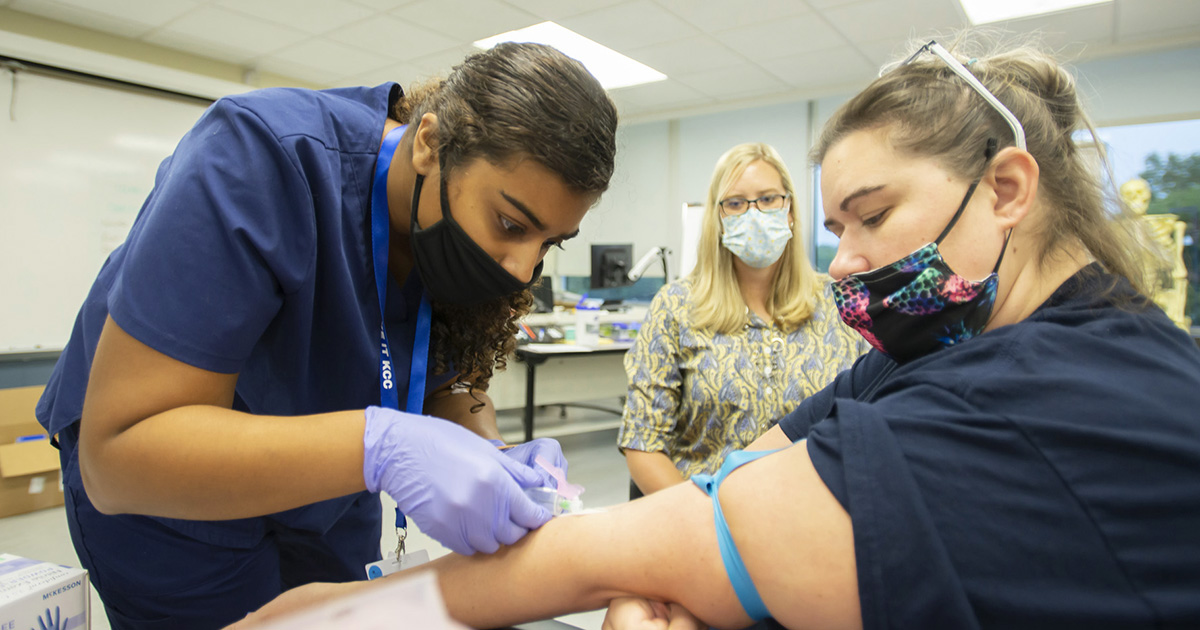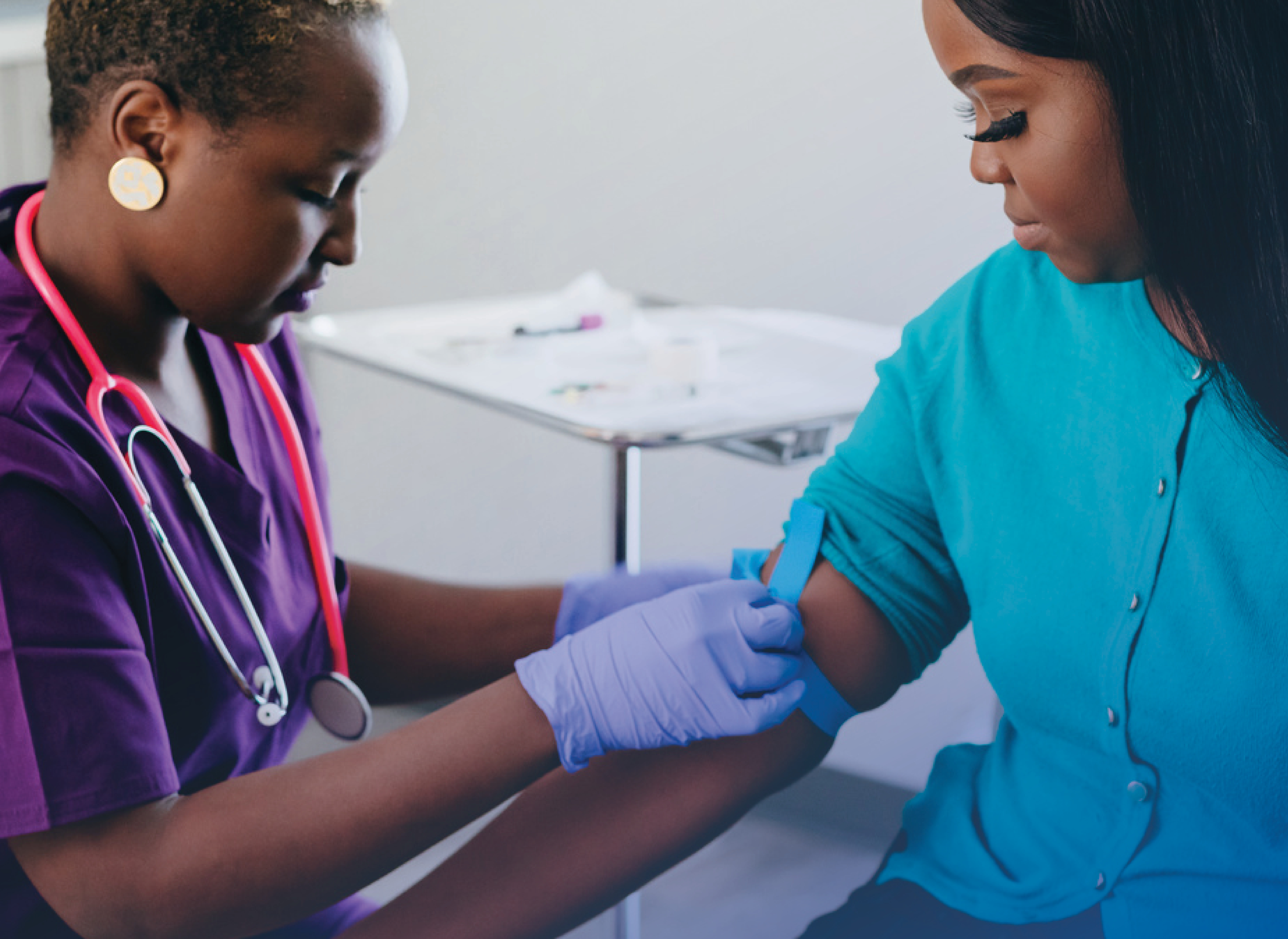Phlebotomy school: Career Pathways
Phlebotomy school: Career Pathways
Blog Article
The Path to Certification: Understanding the Phlebotomy Educating Training Course Trip and Its Value
As you consider the path to accreditation in phlebotomy, it's crucial to understand the function you'll play in healthcare. Your training will certainly cover necessary abilities, from blood collection strategies to patient communication.

The Role of Phlebotomists in Medical Care
Phlebotomists play a necessary duty in the health care system, working as the crucial web link in between individuals and vital diagnostic screening. You'll carry out blood draws, making sure examples are accumulated precisely and safely. Your knowledge assists in identifying clinical conditions, monitoring health, and assisting therapy choices.
In your day-to-day interactions, you'll require to establish depend on with clients, making them really feel comfy during what could be a difficult experience. You are accountable for identifying and managing samples thoroughly to stop contamination or errors, which could impact examination outcomes.
Yet, you'll usually work together with medical professionals and registered nurses, interacting critical information concerning patients' problems. Your role is basic in maintaining the process in healthcare settings, guaranteeing prompt and exact results. By understanding your abilities, you contribute meaningfully to client treatment, making you a vital component of the medical group. Embracing this duty is vital to your success as a phlebotomist.
Introduction of Phlebotomy Training Programs
When exploring phlebotomy training programs, you'll locate numerous types developed to fit various timetables and finding out designs. Each program aids you create essential skills like blood collection and individual interaction. Comprehending these options is vital to choosing the right course for your job.
Kinds Of Educating Programs
Several kinds of training programs are offered for those aiming to come to be efficient in phlebotomy. You can pick from certification programs, which usually last a couple of months and concentrate on vital abilities. There are likewise diploma programs that offer an even more complete education and learning, frequently lasting as much as a year. If you're seeking a deeper understanding, an associate degree in a relevant area might be the right fit. On-line training courses offer adaptability for those balancing work or household dedications, permitting you to examine at your very own pace. Furthermore, some healthcare facilities and centers supply on-the-job training programs, providing practical experience while you find out. Whatever course you choose, each program aims to equip you with the essential skills for a successful phlebotomy job.

Secret Abilities Established
Mastering phlebotomy requires a collection of key skills that are created with extensive training programs. Additionally, communication skills are basic; you'll require to engage with individuals, explain procedures, and placed them at ease. Each of these skills is vital for your success as a certified phlebotomist, making you a beneficial asset in any kind of health care setting.
Secret Components of a Phlebotomy Course
In a phlebotomy training course, you'll concentrate on crucial subjects that lay the foundation for your future occupation. You'll participate in hands-on training that allows you to use what you have actually found out in real-world settings. Both the curriculum and practical experience are crucial for your success as a phlebotomist.
Curriculum Summary
While going after a phlebotomy training course, you'll encounter a curriculum made to outfit you with essential abilities and expertise. Phlebotomy Training Course. This educational program normally includes anatomy and physiology, focusing on the circulatory system and understanding blood components. You'll also learn around various sorts of blood collection approaches, consisting of venipuncture and capillary leak techniques
Furthermore, infection control and safety and security methods are necessary parts, guaranteeing you understand how to keep a sterile atmosphere. You'll examine patient communication, highlighting interaction and empathy, which are crucial for alleviating patient anxiousness. Honest and lawful factors to consider will be dealt with, preparing you for real-world duties. This foundational knowledge will enable you to stand out as a phlebotomist and supply top quality treatment in clinical settings.
Hands-On Training Experience
Obtaining hands-on experience is an important part of your phlebotomy training program. This useful training enables you to apply what you've discovered in a real-world setup, improving your skills and confidence. You'll practice venipuncture techniques, find out exactly how to take care of various sorts of samplings, and get accustomed to the devices utilized in the field. Under the assistance of knowledgeable teachers, you'll improve your skills, ensuring you're prepared for any kind of circumstance you may face.
In addition, you'll get the opportunity to communicate with people, which is necessary for establishing your communication skills. This combination of technological effectiveness and social abilities is critical for your success as a certified phlebotomist. Inevitably, hands-on training is where concept satisfies method, strengthening your expertise and readiness for qualification.
Qualification and Licensing Demands
Prior to click to read more you can start your job in phlebotomy, it is important to recognize the accreditation and licensing needs that differ by state. A lot of states call for phlebotomists to hold a certification from a recognized organization, such as the National Phlebotomy Organization or the American Society for Medical Pathology. These accreditations typically include passing an examination that evaluates your understanding and abilities in the area.
In addition to certification, some states have particular licensing demands. You might require to finish a particular number of hours in scientific Phlebotomy Courses Near Me method, send proof of training, or undergo a history check. It is necessary to investigate your state's regulations to see to it you meet all needed requirements.
Remaining informed regarding these needs not just aids you protect a setting but likewise improves your reputation as an expert. By meeting these needs, you'll be well on your method to a successful career in phlebotomy.
Hands-On Training and Practical Experience
Hands-on training and functional experience are vital components of your phlebotomy education and learning, as they enable you to use academic expertise in real-world scenarios. During your training, you'll take part in supervised venipuncture, find out appropriate techniques, and come to be acquainted with numerous blood collection equipment. This straight participation is vital for developing your self-confidence and honing your abilities.
You'll function closely with knowledgeable specialists who can direct you through the subtleties of individual communication and sample handling. Each session not only strengthens your understanding but likewise prepares you for the busy atmosphere of health care setups.
Furthermore, numerous programs integrate medical rotations, allowing you to experience diverse setups, from medical facilities to outpatient facilities. This direct exposure assists you adapt to various obstacles and individual demands, ensuring you're well-prepared for your future function. Embrace these chances, as they're important to coming to be a qualified and caring phlebotomist.
Difficulties Dealt With During Training
While acquiring hands-on experience is necessary, it is necessary to recognize the obstacles that can emerge throughout your phlebotomy training. You might encounter stress and anxiety when doing procedures on actual individuals, especially if you're brand-new to the environment. The stress to get whatever right can be overwhelming. In addition, understanding the abilities required for blood draws takes method; you might battle with strategy at first.
Time management can additionally be a difficulty, as harmonizing theory, useful sessions, and personal commitments can really feel intimidating. You may encounter varying learning speeds among your peers, resulting in feelings of insecurity if you assume you're dropping behind. Finally, adjusting to the different characters of instructors can be tough, as each may have an one-of-a-kind training style.
Acknowledging these challenges at an early stage can prepare you for success and help you develop strength throughout your training journey.
Profession Opportunities After Accreditation

As you obtain experience, you could also consider specializing in areas like pediatric or geriatric phlebotomy, accommodating specific patient requirements. Some phlebotomists pick to progress their careers by coming to be laboratory professionals or pursuing more education and learning in healthcare areas.
Furthermore, your accreditation can cause duties in training or monitoring new phlebotomists, permitting you to share your knowledge. With the health care industry continuously growing, your abilities will certainly always this hyperlink be in demand, leading the way for a secure and fulfilling profession. Accept the possibilities waiting on you!
Regularly Asked Concerns
What Is the Normal Duration of a Phlebotomy Training Program?
Phlebotomy training courses usually last around four to 8 weeks. You'll take part in hands-on technique, class direction, and on-line understanding. Finishing this training prepares you for accreditation and a gratifying occupation in health care.
Are Online Phlebotomy Courses Available?
Yes, on-line phlebotomy programs are available. They use adaptability and convenience, permitting you to study at your own rate. Just verify the program is recognized to satisfy qualification requirements and get useful abilities for your profession.
Just How Much Does Phlebotomy Training Usually Expense?
Phlebotomy training normally sets you back between $700 and $2,500, depending on the program and location. You should think about aspects like training course size, included products, and hands-on experience when picking the appropriate training for you.
What Prevail Requirements for Phlebotomy Training?
Common requirements for phlebotomy training often include a senior high school diploma or GED, booster shots, and a background check. Some programs might additionally require basic health care expertise or certifications, guaranteeing you're prepared for hands-on training.
Can I Work While Finishing My Phlebotomy Training?
Yes, you can function while finishing your phlebotomy training. Many trainees balance work with their studies, yet ensure to handle your time effectively to ensure you satisfy both job and training dedications successfully.
Report this page